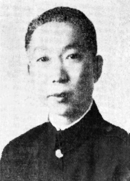Senrian Occupation of Jindao: Difference between revisions
| Line 63: | Line 63: | ||
== Politics == | == Politics == | ||
{{multiple image | {{multiple image | ||
| align = | | align = left | ||
| direction = | | direction = | ||
| width = 130 | | width = 130 | ||
Revision as of 21:05, 28 January 2020
This article is incomplete because it is pending further input from participants, or it is a work-in-progress by one author. Please comment on this article's talk page to share your input, comments and questions. Note: To contribute to this article, you may need to seek help from the author(s) of this page. |
Senrian Jindao 千龍金島 Senryuu Kintou | |||||||||
|---|---|---|---|---|---|---|---|---|---|
| 1933–1935 | |||||||||
| Status | Military occupation by the Republic of Senria | ||||||||
| Common languages | Senrian Xiaodongese Gaullican | ||||||||
| Government | Military occupation | ||||||||
| Prime Minister | |||||||||
• 1933–1935 | Katurou Imahara | ||||||||
| Governor-General | |||||||||
• 1933–1935 | Hatirou Nakayama | ||||||||
| Historical era | Great War | ||||||||
| 10–17 May 1933 | |||||||||
• Surrender of Jindao | 17 May 1933 | ||||||||
| 23 April 1935 | |||||||||
• Handover to Estmere | 25 April 1935 | ||||||||
| Area | |||||||||
| 1933 | 1,125 km2 (434 sq mi) | ||||||||
| 1935 | 1,125 km2 (434 sq mi) | ||||||||
| Population | |||||||||
• 1933 | 566,715 | ||||||||
• 1935 | 435,465 | ||||||||
| Currency | Senrian yen | ||||||||
| |||||||||
| Today part of | |||||||||
The Senrian Occupation of Jindao was a military occupation of the city of Jindao, then under the colonial rule of Gaullica but effective military control of Xiaodong, by the Republic of Senria from the Senrian victory in the Battle of Jindao on May 17, 1933 to the signing of the Treaty of Keisi and subsequent handover to Estmere on April 23–25, 1935. Gaullican colonial governor Égide Brassard was the final governor of the city, but was shot by a Senrian sniper after trying to flee the city on December 15. The occupation is known for its brutality, which displayed a series of mass murders and deportations by Senrian troops. The occupation was one of the longest Senria held on the Xiaodongese mainland, lasting almost a year and a half. The occupation saw the population of Jindao decline by almost 20%, a number that would only take until 1937 to recover.
Background
Senrian invasion of Xiaodong
Battle of Jindao
Politics
Almost immediately after Jindao was seized from Gaullica, Senria declared martial law in the city and gave soldiers in the city almost unlimited powers over the civilian populace. Emphasised by the authoritarian rule of Hatirou Nakayama due to his losses in the Senrian Genocide, Jindao was led fiercely by the Senrian general throughout the occupation. The Senrians utilised the renaming of many major landmarks in Jindao to Senrian-equivalent names, with many street names and districts also being given Senrian names, whilst their Xiaodongese counterparts were outlawed from use. Senrian became a mandatory language to learn for the populace whilst under occupation.
The administrative and military headquarters for the occupational government were set up in the Islands district, making it difficult for guerrilla forces or terrorists to reach the building, the waters being guarded by the Senrian Navy. The military also comprised all political infrastructure within Jindao, including the judiciary, which made the persecution of Xiaodongese prisoners-of-war, some 4,500 of which were captured within Jindao, extremely easy for the Senrian government to achieve. Xiaodongese troops were kept in harsh prisoner-of-war camps and almost always executed within months, mainly in the Chih Te Mo Internment Facility in the south-west of the city. By 1934, the city had lost most of its explicit Xiaodongese characteristics.
Policing in Jindao was conducted by the military, with patrol units often roaming the streets in lieu of an organised police force, which the Senrian government never arranged. Strict curfews were issued throughout the city and those seen outside their residencies outside of curfew hours were regularly shot on sight and their corpses disposed in public places as a warning to other civilians for the consequences of disobedience. St. Chloe's Hospital routinely became full with injured Jindanese civilians in 1933 until Nakayama transformed it into a military hospital and forbade the staff from treating non-Senrians.



